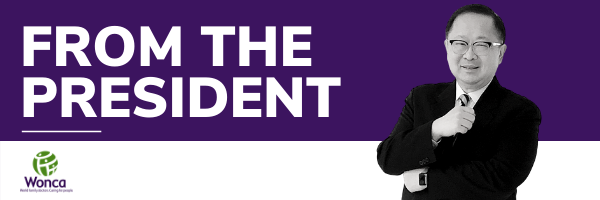From the President: April 2021
 Español Français 中文
Español Français 中文
Each year on 19th May family doctors across the globe – and many of their patients! - celebrate World Family Doctor Day. World Family Doctor Day is an opportunity for all of us - doctors, members of the primary care team, family members and patients – to reflect on the role family medicine plays in our lives. It is easy to take for granted the fact that good quality family medicine looks after more than 80% of the world’s illnesses and diseases, provides immunization and vaccination against most of the world’s preventable diseases, provides education and ongoing support to patients who are tackling long term conditions or trying to take better control of their own health.
The work undertaken by family doctors and primary care teams globally provides the most efficient and effective health care for patients. This is not just a cliché: it is not one of those phrases that, if we say it often enough, it will be true. No. The fact that family medicine is the most efficient and effective way to deliver the best health gain is an indisputable fact, based on rigorous research carried out by well-respected academics. Plotting the course of effectiveness in delivery of comprehensive primary care has been reflected in the findings of the distinguished Barbara Starfield through generations of our members and it continues to the present day.
Research (and the findings from research) in family medicine are crucial mechanisms to reflect more accurately the benefits and the challenges of providing comprehensive primary care in the community setting. Our own WONCA Working Party on Research, expertly chaired by Felicity Goodyear-Smith and with membership from across the globe, addresses a wide range of issues of importance to the growth and development of family medicine globally. Despite huge and ongoing effort, it is still a challenge to adequately and correctly reflect on what inputs in primary care derive the best health outcomes. It is hard to measure many aspects of delivery of primary care in a quantitative way. How can we measure the value of continuity of care over the lifetime of a patient, of keeping a life-long health record for individual patients, of management of multimorbidities in patients, of the recognition and acknowledgement by family doctors of specific challenges facing individual families? As the work of the Primary Health Care Performance Initiative (PHCPI) has shown, collecting quantitative data about primary care delivery is a serious challenge.
Within family medicine, our experience and expertise in Artificial Intelligence (AI) is growing quickly. This is a new development for us and working throughout the pandemic has shown us just how sophisticated telemedicine consultations can be, with high resolution cameras and sound. Despite the excellent resource telemedicine and AI and offer us, nothing will replace the face to face physical contact between a family doctor and the patient, with the doctor taking the pulse of the patient, examining lumps and bumps, using their knowledge of the patient’s history to get a better indication of underlying issues, and providing reassurance and treatment.
As family doctors we are committed to delivering the best quality primary care available within the financial and systemic constraints in which we live and work. Nobody wants to deliver bad health care. We build on our knowledge and skills through learning from research undertaken, from sharing best practice with our colleagues, and from our patients. All of these innovations and traditional skills will take us to our future.
Our theme for World Family Doctor Day 2021 is ‘Building the future with family doctors’. We have available to us plenty of robust research; we have access to innovations in telemedicine and AI, we share experiences of delivering good quality primary care (most especially during the huge challenge posed by the pandemic); and we have enthusiasm for our profession in abundance. Let us show our clinical and health planning colleagues, as well as our politicians, that building the future with family doctors is the right approach, at the right time, to achieve our shared goal of comprehensive patient-centred health services. World Family Doctor Day, on 19th May, is an opportunity to come together as family doctors around the world and consolidate our call for global commitment to delivery of that comprehensive patient-centred health care to each and every person we serve.
Donald Li,
President